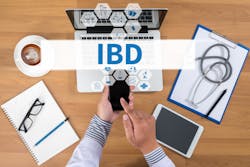Enhancing Care Coordination for Patients With Inflammatory Bowel Diseases
May 19 is World IBD Day, a date when each year people show support for the 10 million people worldwide fighting Crohn's disease and ulcerative colitis, known as inflammatory bowel diseases (IBD). When COVID-19 was starting to break out in New Jersey, multispecialty practice Allied Digestive Health, based in West Long Branch, was just about to go live with a care coordination tool called SonarMD for patients with IBD. Rather than delay the go-live, they plunged ahead and have found it to be a great way to maintain closer contact with patients during the pandemic.
Nadeem Baig, M.D., vice president of Allied Digestive Health, said that in less than two months, all its 50 G.I. physicians signed up to take part in the program, and all eligible patients with inflammatory bowel disease can be enrolled in SonarMD. “So far, out of about 1,000 eligible patients, we have had a 55 percent response rate, which is terrific,” he said, “and a credit to Sonar, our organization and patients who are interested in managing their disease in new and innovative ways.”
Baig described SonarMD as a tool for patients to more proactively monitor their disease. “This has been a change in how we manage and deliver healthcare to our patients in this disease spectrum, which is often quite debilitating to patients,” he said.
SonarMD was founded by Lawrence Kosinski, M.D., M.B.A., formerly one of the managing partners of the Illinois Gastroenterology Group, the largest gastroenterology practice in Illinois. The company's solution sends text or e-mail surveys to the patient, who answers a handful of questions about symptoms on a monthly basis. The results are tabulated into a score called the Sonar score. SonarMD has a team of nurse care coordinators overseeing and reviewing the Sonar scores and they first connect with the patient if they find a score to be abnormal. Then they reach out to the physicians and alert them through a call or message in the EHR and suggest a visit or call with the patient.
Baig explained why it is valuable to more frequently engage patients with Crohn’s disease or ulcerative colitis. “Often patients with chronic illnesses can normalize their symptoms and adapt to them, and make excuses for why they might have more diarrhea or pain – something I ate or something I did,” he said. But this can lead to more detrimental consequences because when they do get sicker and report to their doctor, often it can be too late to proactively intervene and keep them out of the hospitals or surgery. “What Sonar is delivering for us is the ability to more proactively engage instead of being reactive as a care team.”
Catching flareups before they turn into hospitalizations also can save money for insurers. The SonarMD remote monitoring system is part of a value-based care contract Allied is involved in with Horizon Blue Cross Blue Shield of New Jersey. “They have been doing various value-based care models for primary care, specialists, hospitals for several years,” Baig said. “When they learned about Sonar, they were ready to engage quite early. We are partnering with Horizon Blue Cross in enrolling their members who are our patients into this program.” Participation is free for patients, and
Baig described the arrangement as a modification of a shared savings program. There is an upfront payment to physicians to develop infrastructure and manage the illness more proactively. Any savings that are derived from the program for treating IBD patients are shared between the payer, Sonar and the physicians. “We think of this as a triple win,” Baig said. “If we have a successful outcome in this value-based care arrangement with Sonar, the patient wins by getting better management of their disease and less time feeling sick, less time in the hospital, and being able to spend more time at work and with their family and friends; it is a win for the providers, because they get the satisfaction of taking better care of their patients the right way and improving their overall disease state, and they benefit financially; and the payer does as well, by reducing healthcare costs, which ultimately we hope will be passed on to the consumer again.”
Reflecting again on the timing of the roll-out, Baig said he thinks COVID-19 has accelerated the practice’s patient engagement program. “I think it has been a big factor in why we have seen such a high initial enrollment. We made a wise decision to not delay our go-live date when COVID-19 was just breaking out in our state,” he said. “Patients with chronic disease wanted to find another way to remotely engage with their providers, and Sonar was the perfect tool to provide that remote monitoring for patients at a time when patients were not even sure their doctor’s offices were open. In a way it helped our patients and providers engage with this new tool.”


